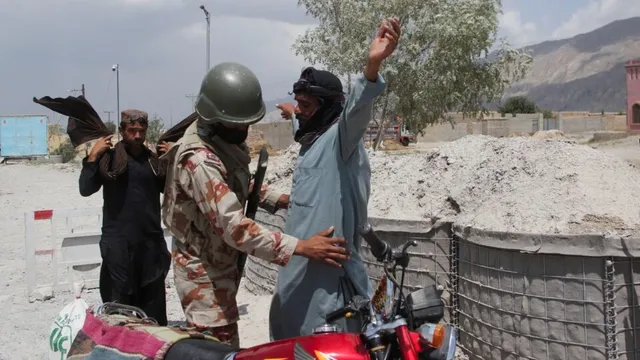- By Supratik Das
- Sun, 18 May 2025 02:27 PM (IST)
- Source:JND
The Baloch National Movement Paank's Human Rights Department condemned in strong terms the secret burial of three Baloch youth by Pakistani security agencies in the Dannuk area of Turbat, calling the practice a gross abuse of human dignity, religious practice, and global standards of human rights.
In a statement shared on X by Paank, the three young men were killed in April while clashing with Pakistani forces. Their families were never notified of their deaths. Instead, the bodies were buried without permission or Islamic burial rites at Aslam Shah Cemetery, causing outrage all over Balochistan. On Tuesday morning, family members of the victims found the graves and started the exhumation process, discovering at least one body and performing reburial rituals as per Baloch customary traditions. Security personnel and local police, tried to block the process, harassing mourning family members especially the women involved by aggravating their trauma.
No Shrouds, No Prayers : Bodies Buried In Dark
The Balochistan Post reported The three bodies were buried at night in Turbat's Taleemi Chowk cemetery without Islamic shrouds (kafan) or funeral prayers. Families report that authorities had denied them release of the bodies or even provide updates on their loved ones, leaving them in distress for days.
Both Paank and the Baloch Yakjehti Committee (BYC) have appealed to international human rights organizations, including the United Nations, to step in and hold the Pakistani government responsible for what they call systematic oppression and genocide in Balochistan. “No amount of intimidation will deter our struggle. We will continue to expose and resist the ongoing Baloch genocide and state repression through grassroots mobilization and political education,” BYC wrote in an X post.
The Balochistan Post also reported that a young man named Shahnawaz, son of Barfi, was detained by security forces in Mashkay, Awaran, and has since gone missing. His family has not received any information about his condition or whereabouts. Such enforced disappearances are not isolated. Human rights groups have documented thousands of cases over the last two decades, with many victims still unaccounted for. A News18 report says 51 extrajudicial killings were reported between January to April 2025 , close to the number of all 2024. The Voice for Baloch Missing Persons (VBMP) has listed more than 7,000 disappearances since 2004.
Member of Afghanistan’s Parliament in Exile, Mariam Solaimankhil says, "... Its not just the Baloch, its also the Pashtun, the Sindhi, and even the Punjabis, everyone is sick of the military dictatorship they have been living under. In Balochistan, we have a peaceful and non-violent activist like Mahrang Baloch who is in prison, but we have people like Osama bin Laden and other terrorists of LeT are allowed to roam freely. In Balochistan, it has been decades of forced disappearances, murders, and the natural resources of Balochistan are being looted but the people are still starving and are still poor..."
#WATCH | California, USA: Member of Afghanistan’s Parliament in Exile, Mariam Solaimankhil says, "... Its not just the Baloch, its also the Pashtun, the Sindhi, and even the Punjabis, everyone is sick of the military dictatorship they have been living under. In Balochistan, we… pic.twitter.com/YBOJQeNyFc
— ANI (@ANI) May 14, 2025
As the pattern of enforced disappearances, extrajudicial killings, and secret burials intensifies, human rights advocates stress the urgent need for international accountability. "Pakistan must stop its policy of repression and be true to its constitutional and humanitarian commitments," said a Paank spokesperson. Balochistan is still one of the most militarised and censored areas in South Asia, with civilians suffering most from violence perpetrated by both state forces and militant groups. Without substantive international pressure, activists caution, peace and justice will never be within reach for the Baloch nation.

